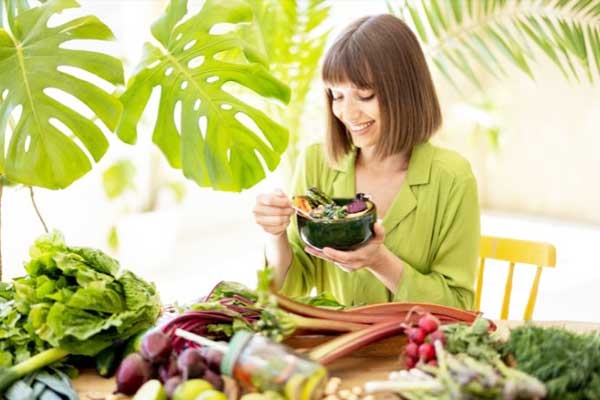
(Image source from: Canva.com)
There are two types of people. There are people who love raw vegetables and people who cannot tolerate raw vegetables. They often argue about which option is healthier. Raw vegetable lovers claim they are nutritious, while those who prefer cooked vegetables cite the possibility of pesticide residues. To eat healthier and reach their weight goals, many people choose salads instead of whole meals. But I'm wondering if you should eat vegetables raw and how it might affect your gut health. Eating raw vegetables has long been known for their health benefits. According to Ayurveda, raw foods, especially vegetables, are considered to be Satvic in nature, meaning they promote the purity and vitality of the body.
Why raw vegetables are great:
Nutrient retention: Raw vegetables often contain more vitamins and minerals than cooked vegetables. For example, heat can destroy sensitive nutrients such as vitamin C.
Hydration: Many raw vegetables are high in water, which helps maintain hydration. Adequate hydration is very important for your overall health.
Antioxidants: It is also a good source of antioxidants, which help fight inflammation and reduce the risk of chronic diseases.
Low Calorie: Raw vegetables are typically low in calories, making them a great way to maintain a healthy weight while getting essential nutrients.
Enzyme activity: Raw vegetables contain natural enzymes that aid digestion but can be lost during cooking.
The fiber in raw vegetables prevents constipation, maintains gut health, lowers blood sugar and cholesterol levels, and makes you feel full, helping you eat less and lose weight. Raw vegetables are important for health and have a very positive effect on our overall health. These act as a protective shield against a variety of health problems, including weak immune systems, iron and calcium deficiencies, high blood pressure, diabetes, obesity, skin health and intestinal problems. However, you should know that some vegetables should not be eaten raw as they may contain harmful substances such as oxalates, solanine and chemical residues.
How you prepare your vegetables makes a big difference:
Cook gently: Light cooking methods such as steaming or frying can actually increase nutrient absorption. Cooking breaks down tough fiber and makes it easier for the body to absorb nutrients.
Raw: Raw vegetables contain heat-sensitive nutrients that are difficult for some people to digest. If you have a sensitive stomach, eating raw vegetables may cause upset.
Cooking: Cooking destroys many nutrients, especially if you throw away the cooking water. So while they still have health benefits, they may not be the best option for maximizing nutrient absorption.
For a balanced diet, doctors recommend mixing both raw and lightly cooked vegetables. Cooked vegetables are easier to digest. This is because cooking breaks down the cell walls of the vegetable, making it easier for the body to digest and absorb the nutrients. The cooking process also helps kill bacteria and makes the food safe to eat. Caramelizing or browning vegetables like carrots, beets, and squash improves their flavor and improves the bioavailability of antioxidants after cooking.
Gut Talk: Adding raw vegetables to your diet is good for your gut health, especially because of their high fiber content.
Digestive Health: Fiber increases stool volume, promotes regular bowel movements and prevents constipation. This is important for digestive health.
Prebiotics: Many raw vegetables act as prebiotics, feeding the good bacteria in your gut. A healthy gut microbiome is essential for digestion and overall health.
However, if you have a sensitive digestive system, raw vegetables can cause gas and bloating. In this case, it may be helpful to start small or mix raw and cooked foods to ease the discomfort.
Concerns about parasites, bacteria and pesticides are real, especially given the increasing use of chemicals in modern agriculture. Research has confirmed the dangers of pesticides and harmful pathogens such as E. coli and salmonella that can be present in raw vegetables. If hygiene standards and proper storage practices are not followed, raw vegetables are at risk of contamination with harmful microorganisms and pesticides. Parasites such as Toxoplasma and Giardia can be transmitted through contaminated soil and cause infections. Pesticides used in agriculture can also remain on the surface of vegetables, which with chronic exposure can lead to long-term health problems such as hormone disruption and cancer.
Now, if you want to eat vegetables raw, make sure to wash, peel, cut and store them hygienically. Soaking vegetables in a mixture of water, salt, or vinegar can remove potential contaminants and harmful microorganisms. Raw vegetables should be eaten immediately or within a few hours of being freshly cut and poured into the sauce. Store it in the refrigerator below 5 degrees Celsius and throw it away if it becomes sticky, has a strange smell or is cloudy. Instead of just consuming raw vegetables, experts recommend a combination of cooked and raw vegetables.







